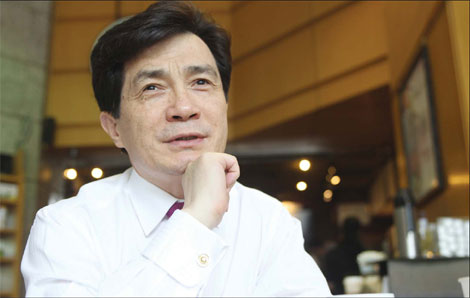Unfair trade wars
Updated: 2011-07-01 10:32
By Andrew Moody, Yan Yiqi and Zhang Yuwei (China Daily European Weekly)
Adam Dunnett, general manager of the European Union Chamber of Commerce in China (EUCCC), says China is moving in the right direction in terms of opening up its markets to foreign competition.
|
 Adam Dunnett, general manager of the European Union Chambers of Commerce in China. [Wang Jing / China Daily]
|
"You have got to recognize that in the past 30 years China has undergone remarkable reforms and opened up many sectors," he says.
"At the same time a significant proportion of the economy - around 30 percent of GDP - is fairly protected."
Dunnett says the big problem is in sectors like the automotive industry, where foreign car companies have little room to maneuver.
"If China's automotive companies want to go abroad they can. Geely bought Volvo and Nanjing Automobile bought MG Rover," he says.
"Not only can a European or foreign car company not buy a company here, it cannot operate in its own right as a wholly owned foreign enterprise. It has to operate in a joint venture where it has a minority stake."
"We understood the need for some of these regulations 30 years ago but China is now a significant economy and the opening up of some of these areas ought to be addressed."
Tao Jingzhou, a partner at the international law firm Dechert in Beijing, has long experience in representing both foreign and Chinese companies, in cases related to protectionism.
|
 Jingzhou Tao, a partner of the law firm Dechert, says it is often difficult to define what protectionism is as there are so many tactics deployed. [Feng Yongbin / China Daily]
|
He says he feared the worst when the G20 nations warned against protectionism in the aftermath of the financial crisis and in a lecture at an event held by The Economist magazine in Beijing said it was the "opening bell" for a wave of measures.
"What I foresaw was a new era of measures for countries to protect their local markets and I was not wrong," he says.
He argues it is often difficult to define what protectionism is since there are so many tactics that are deployed.
"It is just a natural reaction from a government and from players in the local market to try to create parameters to kick people out," he says.
Tao says a lot of the protectionism that now exists in China reflects a change in the balance of power between the country itself and those who want to do business in it.
"In the old days China needed the cash but now they don't. A foreign company used to be able to come here and say it was number one in the world at whatever it did and would be trusted. Now they can easily find out you are only number 21 in the world and therefore the door might not be as open," he says.
"China is now so hot. It is the El Dorado. As we say in Chinese, huangdi de nuer bu choujia, the princess won't worry she won't get married because she has so many suitors."
Li Jian, a researcher with the Chinese Academy of International Trade and Economic Cooperation, which is affiliated to the Ministry of Commerce, says that although there is a potential abundance of marriage partners, it does not necessarily mean that China does not need foreign investment.
"Although there is no longer a shortage of cash in China, the development of China's economy still needs the help of foreign capital," he says.
He does not believe that China is heavily protectionist compared to other countries.
E-paper

Shining through
Chinese fireworks overcome cloudy times, pin hopes on burgeoning domestic demand
Pen mightier than the sword
Stroke of luck
Romance by the sea
Specials

90th anniversary of the CPC
The Party has been leading the country and people to prosperity.

My China story
Foreign readers are invited to share your China stories.

Green makeover
Cleanup of Xi'an wasteland pays off for ancient city
